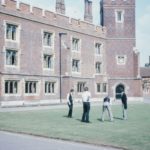 Previous studies have shown a link between one’s wealth and the likelihood that one will vote conservative rather than liberal, so it’s perhaps no great surprise that research from University College London finds that people who went to private schools are twice as likely to be Conservative voters than those who went to state schools.
Previous studies have shown a link between one’s wealth and the likelihood that one will vote conservative rather than liberal, so it’s perhaps no great surprise that research from University College London finds that people who went to private schools are twice as likely to be Conservative voters than those who went to state schools.
The researchers tracked nearly 7,000 people who were each born in 1970 over a number of decades to see whether those educated privately had different voting behaviors in the elections between 1997 and 2010 than those educated in state schools.
Leaning to the right
“Our key conclusion is that, among both males and females, there is a notable direct association between private schooling in the mid-1980s and later voting Conservative, and the expression of right-wing attitudes in midlife, which cannot be explained by family background and related factors,” the researchers explain.
“The significance of the findings arises because the political attitudes of many of those who attended private school during the 80s and 90s are important, since a disproportionate number of private school alumni have reached positions of substantive influence in public and commercial life, such as in Parliament, the cabinet, the senior judiciary, the press commentariat and CEOs of FTSE companies.”
The research used the 1970 British Cohort Study survey data on 6,917 nationally-representative people born in England and Wales during one week in 1970. This nationally-representative sample provided insight into subjects’ family background, education, political attitudes at age 42, voting habits during the general elections of 1997, 2001, 2005, and 2010, as well as their attitude towards trade unions at age 16.
Within this sample, a mere 3.0% (3.3% men and 2.8% women) of participants attended a private primary school prior to the commencement of their secondary education. Furthermore, 6.2% (6.8% men and 5.7% women) of respondents attended a private secondary school.
Conservative support
The research found that those who received a private education were twice as likely to be consistent Conservative voters, having voted for the party in three or four of the past four general elections.
Additionally, these individuals were 1.5 times more likely to hold right-wing views compared to their state-educated counterparts, as determined by their level of disagreement with statements regarding government redistribution of income, big business benefits, and unequal application of the law for the rich and poor. Remarkably, these effects persisted even after controlling for the combined influence of parental income, education, and social class.
Interestingly, the impact of private education on voting Conservative was more pronounced among men, while the effect on holding right-wing views was greater for women. In contrast, obtaining a university degree tended to decrease the likelihood of voting Conservative but did not significantly alter the chances of holding right-wing opinions.
Peer impact
“Given that a private school community can become relatively closed—especially when it is a boarding school—these peer effects have a strong social character. Such peer effects may be long-lasting, especially if they become reinforced through post-school networks,” the researchers explain.
This is especially important as numerous studies have highlighted the greater proportion of privately educated people in positions of public influence than would ordinarily be expected.
“There is a prima facie link between British private schools and politics, which can be illustrated by the fact that 41% of Conservative Members of Parliament were privately educated, compared to 14% of Labour MPs,” the authors econclude. “This compares to 7% of the general population. More than half of junior government ministers, and a third of the British Chairs of FTSE 100 companies were privately schooled.”